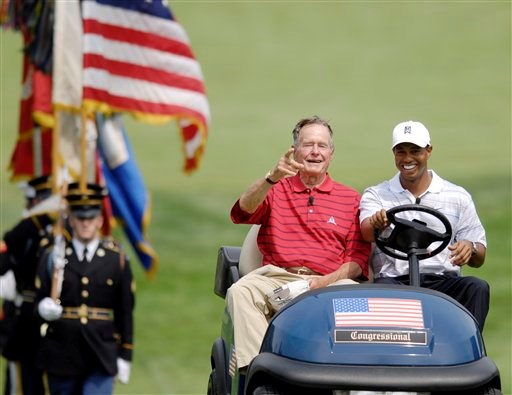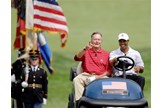July5 WoodsTournament
Last updated:
At 6:30 a.m. on a pristine Fourth of July, tournament host Tiger Woods teed off with a solider and an airman to open the pro-am. The gallery that followed them was bigger than any that trailed the leaders in the early rounds of last year’s Washington-area PGA Tour stop, the Booz Allen Classic.
At No. 7, Woods asked Sgt. Michael Woods, the special guest caddie for the hole, to read a 12-foot birdie putt. Woods then handed the sergeant the club and said: “Here you go.” The surprised and nervous sergeant sank the putt, Woods thrust his arms in the air, and the crowd went wild.
At 11:28 a.m., former President George H. W. Bush, who arrived on a golf cart driven by Woods, provided the highlight of a star-spangled opening ceremony by hitting a drive at the first tee of the famed Blue Course, whose holes were marked by pins with miniature American flags instead of the usual hole numbers.
“If anybody laughs when I hit it, they’re dead – we’ve got Secret Service here,” Bush said with a chuckle before hitting the shot that landed just short of a 60-foot American flag held by local veterans.
It was all so perfect, especially for a tournament didn’t exist as of five months ago – and in an area that thought it had lost its spot on the tour for many years to come.
The inaugural AT&T National – more commonly known as Tiger’s Tournament – begins Thursday, and the stars have aligned quickly to make it the biggest sporting event for the nation’s capital since major league baseball’s return in 2005. It features the sport’s top name, one of its best courses, a military tie-in surrounding the most patriotic of holidays and an impressive field of golfers who rearranged their schedules to be here.
“To actually have it on July 4th weekend, the nation’s capital and all of the things together, and throw in Tiger as the host, that’s pretty big,” eight-time tour winner Fred Funk said. “It did come back with a bang.”
Funk, a former golf coach at the University of Maryland, did his best for years to wave the banner for the PGA Tour’s annual trip to Washington. He was upset last year when news came that the Booz Allen Classic was being taken off the calendar, a casualty of inconsistent scheduling, a much-derided TPC at Avenel course and general apathy among the top players.
It took a remarkable sequence of events to turn things around. Woods began showing interest two years ago in hosting a tournament – similar to Jack Nicklaus’ Memorial and the Arnold Palmer Invitational – but the PGA Tour had a full roster set through 2012.
“I was very interested,” commissioner Tim Finchem said. “But I didn’t see it happening for a period of time.”
Then the Booz Allen Classic lost its sponsor, which wasn’t happy about plans to move the tournament to the fall. The tour then took Washington off its calendar altogether for 2007.
In February, the International in Denver was canceled because it couldn’t find a sponsor. That left a hole in the schedule during the Fourth of July week.
Enter Woods, whose charitable foundation and the tour worked furiously to line up a sponsor and began courting the membership at Congressional. Finchem initially wasn’t sure the plan would work, so he had Portland, Ore., and the Twin Cities as backup alternatives that would not have involved Woods as host.
In a matter of days, the deals were struck. Congressional later agreed to be the venue, if only for the first two years. Woods became hands-on with some of the planning details, juggling his newest venture with his golf game and the impending birth of his first child, who was born 2 1/2 weeks ago.
“What we’ve done here in such a short span of time,” Woods said, “has been absolutely remarkable.”
Washington was a logical choice because it provided a chance to mend bad feelings over the loss of the Booz Allen. Also, Woods wanted to use the tournament to pay tribute to the armed forces and honor his father, who was a Green Beret in Vietnam. Woods said this week that he would have followed his father’s career path if golf had not worked out.
“I told dad, ‘If I didn’t make it in the first two years, it’s probably where I would go,”’ Woods said. “I don’t know what branch, but I certainly would want to get into the special operations community.”
“But somehow I ended up here,” he said with a smile. “Made a couple of putts in those years.”
So the story culminates with Woods, Phil Mickelson, Vijay Singh, Jim Furyk and Adam Scott – five of the top six golfers in the world – headlining a D.C. tournament no one would dare call second tier.
“You only have a few players – maybe one per generation – that carry with them the import and impact of a Palmer or Nicklaus,” Finchem said. “And we think that’s the situation here, given what Tiger has achieved.”
![]()

